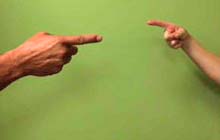Many years ago I was given a two page typed document which contained a simple, but very profound statement: “Taking offense is a lying way of giving offense.” The rest of this document, which was attributed to the Arbinger Institute, explained in fairly simple terms a somewhat complex pattern of mutual, collusive blaming and taking offense. This pattern is exhibited commonly between individuals, in families, within organizations, between large groups of people, and even between nations.
We all learn this early in life. The young child who cries and says “He hurt my feelings” learns that she gets sympathy, and anything she may have done is forgotten as the attention shifts to this “meany” who must pay the consequences. The basis of this pattern is so simple, yet can be so hard to really grasp: Any time we take offense at something someone says or does, we in effect, are attacking them by the accusation. Taking offense IS an offense. Playing the victim is really an act of aggression.

This pattern is so pervasive in our world today. There are examples in the news everyday. This pattern is largely what keeps our courts busy and enriches attorneys. It encourages and escalates protests. Movements for “equality” include the accusation that others have “offended” some group through discrimination or “unequal” treatment.
I must admit that there are real, intentional offenses against people – especially any attacks on children or the disabled. The problem is that we are all imperfect judges of another’s intent. We too often make assumptions and take offense where none was intended. But is taking offense even when it is intended always necessary, justified, or wise? Some may think that an obviously offended person (a victim of a real crime, for example) who does not react or retaliate is stupid or oblivious for not seeing that they were violated. Maybe they were actually very wise to realize that what some might perceive as an offense to them, really had nothing to do with them at all.
“Taking offense is a lying way of giving offense”
Behind this pattern of taking offense is a great lie: We have no control over our feelings. This we also learn to believe early in life. “He hurt my feelings” “She made me mad”. We want to feel justified in our feelings, but by attributing their cause to another, as if totally out of our control, we are living a lie. We are not animals functioning with only reflexes and instincts. We are human beings capable of rational thought and also capable of choosing reactions to provocation. Often we think we are in control if we keep from acting out, but accusing others starts with our thoughts, which then fuel our feelings and too often result in actions. Even if we don’t act or even say anything, we can still be accusing in our thoughts and feelings. These accusing thoughts and feelings color our interactions with others, often in a self-fulfilling way. We tend to see offenses everywhere. We may feel persecuted. We act like victims.
The choices we need to make must start back with thoughts. As long as we think of another as an offender, rather than as another imperfect human being trying to do what they think is right, we will continue to feel offended. Remember “take offense” is a verb – it is something we do and something we can choose not to do.
Years ago as I studied and pondered the principles outlined in this paper, I was first able to see obvious examples in the world around me. It took much more time to begin to see clearly my own personal offenses by taking offense. Seeing how another had taken offense at unintended things I had said or done kept me feeling offended. Trying to stop the pattern by pointing out how another is taking offense and hoping they will see this and stop is useless. The lesson I finally learned was that the one and only thing I could actually do to change this pattern, was to change myself and my own reactions. The only hope in stopping this pattern of collusion is for one party to stop – to stop taking offense.
Note: Much of my personal insights came from reading the book by C. Terry Warner, Bonds that Make us Free

2 thoughts on “Taking Offense”